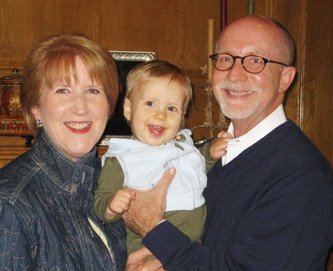"I want to be a good grandmother (father) but I want to live my life, too." The refrain echoes around the country as more grandparents assume responsibility for their grandchildren.
One in 10 children lives with a grandparent, according to a Pew Research Center study in 2010. The trend has risen slowly since 2000, with a sharp spike in 2007-2008, the first year of the so-called "Great Recession." Grandparents also often are the primary caregivers for grandchildren who do not live with them.
Although the trend is more prevalent among African-Americans and Hispanics, it rose sharpest in that first year among whites, rising by 9 percent, with an increase of 2 percent among African-Americans. Pew noted more African-Americans are parenting grandchildren than are other groups. More women than men provide care for their grandchildren.
While the majority of caregivers fall between the ages of 45 and 59, some are in their 80s.
"Each (generation has) much of the same emotional and spiritual needs, but each generation has a different set of social norms, values, cultures, expectations, physical and support needs," said Sandy Abernathy, a retired assisted-living/Alzheimer's administrator in Tennessee.

For grandparents Joanna and Marv Knox, each moment spent with grandson Ezra is a treasure because it's never as often as they desire. But for other grandparents, who have the responsiblity of full-time care of their grandchildren, the challenges can be many.
|
Many factors contribute to the growing need for people who thought their parenting days were over to take on those responsibilities again. Today's economy has forced more parents to accept lower-paying jobs, and many adult children are returning home or having their parents live with them. To help save money, grandparents take care of the children.
Death of one or both parents, job loss, and parental drug or alcohol use also are reasons grandparents can be called on to raise children.
Most grandparents, even Baby Boomers—sometimes referred to as the "me" generation—will step up for their grandchildren.
Sign up for our weekly edition and get all our headlines in your inbox on Thursdays
"Christian grandparents often rise to the need of their grandchildren before they rise to their own needs," said Abernathy, former director of ElderCare for Buckner International.
"The nature of the (Boomer) generation is to rise to the occasion and to work hard to accomplish their goals. They achieve and expect success. Boomers will be harder on themselves and may even overcommit in caring for children," she added.
Even though marketing may try to tell mature adults "they want to live by the ocean and play golf every day," Abernathy said that vision "probably does not hold any resemblance to the real self-fulfilling expectations of the average grandparent in our churches today."

|
Today's "culture conflicts with the American reality and with our Christian expectations," she said. "The generations that make up our grandparents today still hold to most traditional expectations of that role."
Usually grandparents will do whatever it takes to protect their grandchildren, noted Cheryl Williams, director of apartment ministries for Buckner International.
"Grandparents will hold on for dear life" rather than turn children over to a government agency or other organization for their care, she said.
Williams oversees the Wynnewood Community Center in an inner-city apartment complex in South Dallas, where 75 percent of the residents are single parents or grandparents raising grandchildren.
While the grandparents she works with love and want to care for the children, they sometimes struggle with guilt.
Many ask themselves what they did wrong in raising their own children and chastise themselves about their earlier parenting skills, Williams explained.
They also wrestle with guilt over their feelings: "I want to live my own life, but now I have to raise a child. My life is on hold again."
Often grandparents must help their grandchildren deal with stressors and anger over the family's situation.
Children sometimes work out their anger in behavioral problems, and grandparents often aren't prepared to handle it, Williams said.
Most are willing to try. "Our American culture and especially TV says to think of yourself, but most grandparents have difficulty doing that in the face of a grandchild in need," Abernathy said.
"The requirements needed to take care of a child are great, but usually so are the rewards.
"Grandparents have usually experienced childrearing and know those rewards and the pain."















We seek to connect God’s story and God’s people around the world. To learn more about God’s story, click here.
Send comments and feedback to Eric Black, our editor. For comments to be published, please specify “letter to the editor.” Maximum length for publication is 300 words.